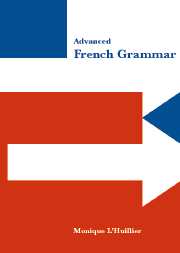Book contents
39 - Interrogative and exclamative structures
Published online by Cambridge University Press: 05 June 2012
Summary
Interrogative form: introduction
The interrogative sentence is opposed to declarative, exclamative and imperative sentences. It is generally a request for information and forms the first part of the couple question–answer. One should distinguish between the following:
(i) Total interrogation (interrogation totale ou générale)
Total interrogation is determined and can relate to the verb, the subject, the object, etc. of the sentence (see also chaper 38 Negative Structures, section 1).
Consider the following example:
Le chien a cassé le vase.
→ Est-ce que le chien a cassé le vase?
The interrogation relates to:
– the subject:
Oui/Non[, ce n'est pas le chien mais le chat].
– the object:
Oui/Non[, pas le vase mais le pot de fleurs].
– the verb:
Oui/Non[, il ne l'a pas cassé; il l'a seulement renversé].
In any case, there is no new information and the question invites a yes or no answer.
(ii) Partial interrogation (interrogation partielle ou particulière)
Partial interrogation is undetermined. It appeals for a piece of information which is not contained within the question itself and which is supplied in the answer. The question can relate to:
– the subject (identity of the referent).
Ex: Qui vient d'arriver? – Eric.
– a direct or indirect object and, more specifically:
– the nature of the referent which is the object of the verb.
Ex: Que manges-tu? – Un pain au chocolat.
A quoi tu penses? – Aux vacances.
– the identity of the referent of the object.
Information
- Type
- Chapter
- Information
- Advanced French Grammar , pp. 636 - 659Publisher: Cambridge University PressPrint publication year: 1999
